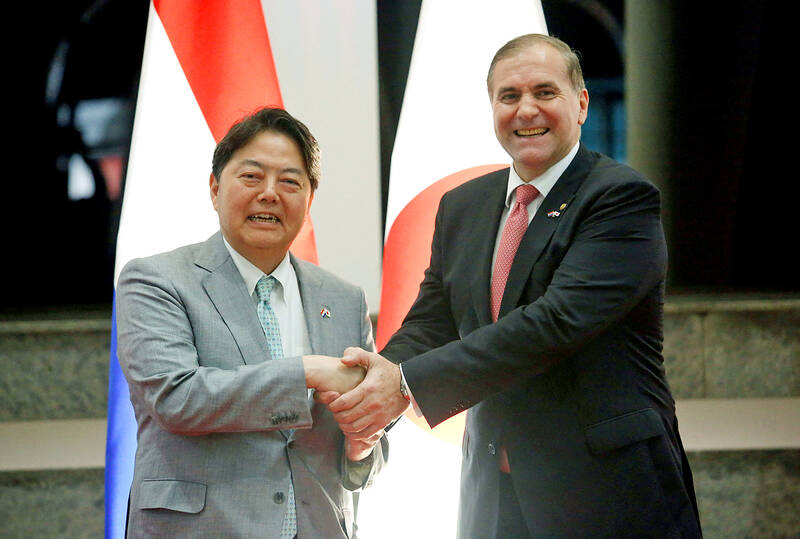Japan is engaging with Taiwan’s allies to prevent them from leaning toward China, Japan’s Nihon Keizai Shimbun reported.
Japanese Minister of Foreign Affairs Yoshimasa Hayashi visited Paraguay, Taiwan’s only diplomatic ally in South America, on Saturday and met with Paraguayan president-elect Santiago Pena, it reported.
Hayashi and Pena pledged to maintain and bolster the “free and open international order based on the rule of law,” it said.

Photo: Reuters
Paraguayan Minister of Foreign Affairs Julio Cesar Arriola also voiced support for Japan’s policy of a “free and open Indo-Pacific,” it said.
Since Japanese Prime Minister Fumio Kishida took office in October 2021, his foreign ministers and state ministers have had discussions with counterparts from nine of Taiwan’s diplomatic allies, the report quoted data from the Japanese Ministry of Foreign Affairs as showing.
Japanese State Minister of Foreign Affairs Shunsuke Takei visited Tuvalu during the “Golden Week” holiday last week, and Hayashi visited Palau during the same period last year, it said.
China offers tempting opportunities for investments and export destinations for developing countries, it said, adding that China is attempting to isolate Taiwan through diplomatic means.
Japan is fostering solidarity with Taiwan’s allies in the face of Chinese expansionism, which demonstrates its effort to prevent Taiwan from being isolated from the international community, it said.
The engagements might be motivated by concern over a possible Taiwan emergency, in which Japan expects Taiwan-friendly countries to enlist international cooperation to support the nation, it said.
As a host country for the G7 summit this year, Japan opposes any unilateral change to the cross-strait “status quo,” and calls for peaceful solutions, it said.
In other news, a survey conducted by Kyodo News showed that nearly 90 percent of Japanese are concerned about a possible Chinese invasion of Taiwan.
Eighty-nine percent of respondents said they were “very concerned” or “somewhat concerned” about the possibility of a Taiwan emergency caused by China’s military action, it reported on Saturday.
Asked about Kishida’s plan to raise taxes to fund a proposed increase in military spending, 19 percent of respondents said they supported it, while 80 percent said they did not, it reported.
The Japanese government allocated a defense budget of about ¥43 trillion (US$318.9 billion) for the five-year period starting this year, more than 1.5 times the previous budget, it said.
More than half of respondents , or 58 percent, consider the budget “inappropriate,” it said.
Given the severe security environment, Japanese consider strengthening defense capabilities to a certain extent unavoidable, but are not in favor of a large increase in defense spending or tax hikes, the report said.
The response “People cannot bear the additional tax burden” was cited by 48 percent of respondents as why they opposed tax increases, it said.
Nearly three-quarters of them — 73 percent — opposed diverting funds allocated for reconstruction projects following the 2011 Tohoku earthquake and tsunami to defense spending, it said.

The Coast Guard Administration (CGA) yesterday said it had deployed patrol vessels to expel a China Coast Guard ship and a Chinese fishing boat near Pratas Island (Dongsha Island, 東沙群島) in the South China Sea. The China Coast Guard vessel was 28 nautical miles (52km) northeast of Pratas at 6:15am on Thursday, approaching the island’s restricted waters, which extend 24 nautical miles from its shoreline, the CGA’s Dongsha-Nansha Branch said in a statement. The Tainan, a 2,000-tonne cutter, was deployed by the CGA to shadow the Chinese ship, which left the area at 2:39pm on Friday, the statement said. At 6:31pm on Friday,

The Chinese People’s Liberation Army Navy’s (PLAN) third aircraft carrier, the Fujian, would pose a steep challenge to Taiwan’s ability to defend itself against a full-scale invasion, a defense expert said yesterday. Institute of National Defense and Security Research analyst Chieh Chung (揭仲) made the comment hours after the PLAN confirmed the carrier recently passed through the Taiwan Strait to conduct “scientific research tests and training missions” in the South China Sea. China has two carriers in operation — the Liaoning and the Shandong — with the Fujian undergoing sea trials. Although the PLAN needs time to train the Fujian’s air wing and

STRIKE: Some travel agencies in Taiwan said that they were aware of the situation in South Korea, and that group tours to the country were proceeding as planned A planned strike by airport personnel in South Korea has not affected group tours to the country from Taiwan, travel agencies said yesterday. They added that they were closely monitoring the situation. Personnel at 15 airports, including Seoul’s Incheon and Gimpo airports, are to go on strike. They announced at a news conference on Tuesday that the strike would begin on Friday next week and continue until the Mid-Autumn Festival next month. Some travel agencies in Taiwan, including Cola Tour, Lion Travel, SET Tour and ezTravel, said that they were aware of the situation in South Korea, and that group

Taiwanese celebrities Hank Chen (陳漢典) and Lulu Huang (黃路梓茵) announced yesterday that they are planning to marry. Huang announced and posted photos of their engagement to her social media pages yesterday morning, joking that the pair were not just doing marketing for a new show, but “really getting married.” “We’ve decided to spend all of our future happy and hilarious moments together,” she wrote. The announcement, which was later confirmed by the talent agency they share, appeared to come as a surprise even to those around them, with veteran TV host Jacky Wu (吳宗憲) saying he was “totally taken aback” by the news. Huang,